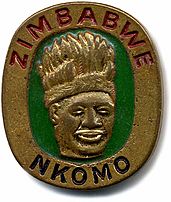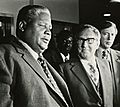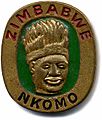Joshua Nkomo facts for kids
Quick facts for kids
Dr. Joshua Nkomo
|
|
|---|---|
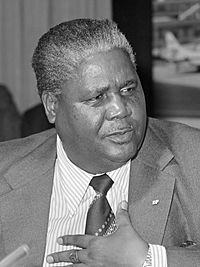
Nkomo in 1978
|
|
| 1st Second Vice-President of Zimbabwe | |
| In office 6 August 1990 – 1 July 1999 Serving with Simon Muzenda
|
|
| President | Robert Mugabe |
| Preceded by | Office established |
| Succeeded by | Joseph Msika |
| 1st Minister of Home Affairs of Zimbabwe | |
| In office 1980 – February 1982 |
|
| President | Canaan Banana |
| Prime Minister | Robert Mugabe |
| Preceded by | Herbert Zimuto (Zimbabwe Rhodesia) |
| Succeeded by | Herbert Ushewokunze |
| Personal details | |
| Born | 19 June 1917 Matopos, Southern Rhodesia |
| Died | 1 July 1999 (aged 82) Harare, Zimbabwe |
| Resting place | National Heroes Acre |
| Nationality | Zimbabwean |
| Political party | ZANU-PF ZAPU |
| Spouse |
Johanna Fuyana
(m. 1949) |
| Relations | Michael Nkomo (son) |
| Children | 4 |
| Residence | Bulawayo |
| Alma mater | Jan H. Hofmeyr School of Social Work University of South Africa (BA) |
| Profession | Politician, guerrilla leader, trade unionist, businessman |
Joshua Mqabuko Nyongolo Nkomo (born June 19, 1917 – died July 1, 1999) was an important Zimbabwean leader. He fought for his country's freedom and later became a politician. From 1990 until his death in 1999, he served as the Vice-President of Zimbabwe.
Nkomo started the Zimbabwe African People's Union (ZAPU) in 1961 and led it for many years. In 1987, ZAPU joined with Robert Mugabe's Zimbabwe African National Union (ZANU) to form ZANU–PF. This happened after a difficult time of conflict that affected many ZAPU supporters.
Before becoming a politician, Nkomo was a strong leader for workers' rights. He became president of the National Democratic Party, which was later banned. The white minority government of Rhodesia put him in jail for ten years. After he was released in 1974, ZAPU helped to bring down that government.
In 1983, Nkomo had to leave the country because he feared for his safety during a period of violence. Later, in 1987, he signed the Unity Accord. This agreement allowed ZAPU to merge with ZANU. Many people believe this helped to stop further violence.
Joshua Nkomo was known by many special names. In the Ndebele language, he was called "Umafukufuku". In English, people called him "Father Zimbabwe". In the Shona language, he was "Chibwechitedza", which means "the slippery rock". People also respectfully called him "uMdala" or "uMdala wethu", meaning "our elder".
Contents
Early Life and Education
Joshua Nkomo was born on June 19, 1917, in Matopos, Matabeleland, which was then called Southern Rhodesia. He came from a family that was not rich and had seven brothers and sisters. His father, Thomas Nyongolo Letswansto Nkomo, was a preacher and also raised cattle. His mother was Mlingo Hadebe.
After finishing primary school in Southern Rhodesia, Nkomo learned carpentry at the Tsholotsho Government Industrial School. He then worked as a driver. He also tried farming animals and later became a schoolteacher, teaching carpentry at Manyame School in Kezi.
In 1942, when he was 25, Nkomo decided to go to South Africa to study more. He wanted to improve his carpentry skills and get a higher qualification. He attended Adams College and the Jan H. Hofmeyr School of Social Work. While there, he met other future leaders, like Nelson Mandela. In 1952, he earned a diploma in social work from the Jan Hofmeyr School. Nkomo married Johanna MaFuyana on October 1, 1949.
Early Political Journey (1947–1964)
When Nkomo returned to Bulawayo in 1947, he became a leader for black railway workers. He quickly rose to lead the Railway Workers Union. Later, he became the head of the Southern Rhodesian branch of the African National Congress.
In 1953, he tried to become a Member of Parliament but did not win. The Southern Rhodesian ANC branch later became the Southern Rhodesia African National Congress (SRANC). In 1957, Nkomo was chosen as its chairman. In 1959, while Nkomo was out of the country, the SRANC was banned. Its property was taken, and many of its leaders were arrested.
On January 1, 1960, Nkomo and other SRANC leaders started a new party called the National Democratic Party (NDP). This party continued the goals of the banned SRANC. Nkomo became the president of the NDP with support from Robert Mugabe. However, the Rhodesian government banned the NDP in December 1961.
Nkomo quickly formed the Zimbabwe African Peoples Union (ZAPU) with other leaders like Ndabaningi Sithole and Robert Mugabe. But the white minority government banned ZAPU just nine months later, in September 1962.
In 1963, ZAPU had a split. Sithole and Mugabe left to form the Zimbabwe African National Union (ZANU). This split was mainly because Sithole and Mugabe wanted to take control of ZAPU from Nkomo. ZAPU continued to be a party that included people from different ethnic groups until Zimbabwe became independent.
Fighting for Freedom
In 1964, Ian Smith's government arrested Nkomo and other leaders. They were held at Gonakudzingwa Restriction Camp until 1974. Many of them were released because of pressure from the South African prime minister.
After his release, Nkomo went to Zambia. From there, he continued to oppose the Rhodesian government. He used both armed resistance and talks to achieve freedom. ZAPU had an armed group called the Zimbabwe People's Revolutionary Army (ZIPRA). ZIPRA used both guerrilla warfare (small, surprise attacks) and more traditional military tactics. At the time of independence, ZIPRA had modern military equipment.
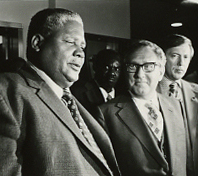
Joshua Nkomo was targeted in two attempts to kill him. The first attempt in Zambia was stopped. The second attempt by the Rhodesian Special Air Service (SAS) also failed. In 2011, the BBC reported that the British government had warned Nkomo about these plots.
ZIPRA forces helped to weaken the Rhodesian government during the Bush War. One of their most talked-about actions was shooting down two Air Rhodesia civilian planes.
- The first plane was shot down on September 3, 1978. Many people died in the crash. Nkomo later said he regretted the loss of civilian lives. He also said that the Rhodesian government sometimes used civilian planes to carry military people.
- The second plane was shot down on February 12, 1979. All 59 people on board died. The real target of this attack was a high-ranking general.
Political Life (1980–1999)
In 1979, Zimbabwe-Rhodesia held its first election where most people could vote. A government was formed, but the civil war continued. Britain then brought all parties together for talks in September 1979. These talks were held at Lancaster House to create a new constitution and plan for new elections. Mugabe and Nkomo worked together as one group called the Patriotic Front (PF) during these talks.
Nkomo suggested a plan to deal with land ownership in Zimbabwe-Rhodesia. He believed that people should pay rent for the land itself, but keep the value of any buildings or improvements they made.
Elections were held in 1980. Many people, including Nkomo, were surprised by the results. ZAPU won 20 seats in Matabeleland, while Mugabe's ZANU–PF won most of the seats in other areas. Nkomo was offered the important but mostly ceremonial role of President, but he chose to become the Minister of Home Affairs instead.
Challenges with Mugabe
Even though they had achieved their main goal of ending the white minority rule, Nkomo and Mugabe found it hard to work together. They had different ideas about how the country should be run. Mugabe followed Marxism, while Nkomo had different economic ideas.
Mugabe also did not fully trust Nkomo because of his ethnic background. He worried about possible uprisings from the Ndebele people. Nkomo tried to improve their relationship many times. Sally Hayfron, Mugabe's wife, was one of the few people in Mugabe's party who supported Nkomo and helped him.
At first, Mugabe did not give Nkomo the job of Minister of Defence, which Nkomo had hoped for. After Sally Hayfron stepped in, Nkomo was given a cabinet position. However, in 1982, he was accused of planning to overthrow the government. This happened after some agents secretly placed weapons on farms owned by ZAPU and then told Mugabe about them.
Mugabe publicly said that Nkomo and ZAPU were dangerous. He then sent a military unit called the Fifth Brigade into Nkomo's home region of Matabeleland. This period of violence was called Gukurahundi. It resulted in the deaths of many Ndebele civilians. Mugabe's goal was to weaken ZAPU and create a one-party state. Nkomo had to flee the country for his safety.
Nkomo later said that he expected people to make up stories about his escape. He added that he was not prepared for such harsh treatment from a government led by black Africans.
After the Gukurahundi violence, Nkomo agreed in 1987 to merge ZAPU with ZANU. This created a single party called ZANU-PF, making Zimbabwe almost a one-party state. Some Ndebele people felt Nkomo had given up too much. However, these people were a small group within ZAPU. As part of the agreement, Nkomo became Vice-President in 1990. This position, however, had little real power. As his health declined, his influence also lessened.
Later in his life, Nkomo explained that he agreed to the merger to stop the killing of Ndebele people and ZAPU politicians. He said that Mugabe and his allies had always wanted to get rid of the Ndebele people.
Personal Life
Family
Nkomo married his wife Johanna in 1949. They had four children: Thandiwe Nkomo, Ernest Thutani, Michael Sibangilizwe, and Louise Sehlule.
Beliefs
Nkomo had a chaplain from the Presbyterian Church of Southern Africa during his time in the military. He also became a Methodist lay preacher. Although he was not a regular churchgoer in 1962, he returned to preaching after he retired. He respected traditional African religions and used their ceremonies in his political campaigns. In his final years, he became a Roman Catholic.
Death
Joshua Nkomo passed away from prostate cancer on July 1, 1999. He was 82 years old and died at Parirenyatwa Hospital in Harare.
Legacy and Honours
After Nkomo's death in 1999, letters he supposedly wrote to Prime Minister Robert Mugabe while in exile became known. In these letters, he spoke out against his unfair treatment and accused the government of cracking down on opposition.
In 1999, Nkomo was declared a National Hero. He is buried at the National Heroes Acre in Harare, a special burial place for important national figures.
On June 27, 2000, the Post and Telecommunications Corporation of Zimbabwe released a set of four postage stamps featuring Joshua Nkomo.
Images for kids
-
Joshua Nkomo meeting with U.S. Secretary of State Henry Kissinger in Zambia in 1976
See also
 In Spanish: Joshua Nkomo para niños
In Spanish: Joshua Nkomo para niños
 | Bessie Coleman |
 | Spann Watson |
 | Jill E. Brown |
 | Sherman W. White |


